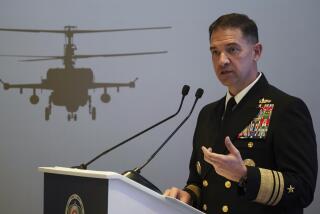U.S., Allies to Join in ‘Clean Sweep’ of Gulf : Waters to Be Cleared of Mines in Informal Pact
- Share via
WASHINGTON — Five NATO allies--Britain, France, Italy, the Netherlands and Belgium--have agreed to help the United States make a “clean sweep” of mines from the Persian Gulf, working through an informal unified command, Defense Department officials said Sunday.
The plan is designed to keep five minesweepers operating in the gulf at any one time, the officials said, on a timetable sufficiently frequent to cover the entire area and keep shipping lanes relatively secure.
The officials, who spoke on condition that they not be identified, said the cooperation of the allied navies is especially welcome in offsetting congressional criticism that Washington’s monthly cost of $25 million to $30 million is too heavy a share of the cost for protecting oil shipments that go largely to Europe and Japan.
Longtime Cooperation
Rear Adm. J. S. Tichelman, naval attache of the Netherlands Embassy here, said the Northern European allies have worked together in the North Sea for decades and have continued to do so since undertaking their mission in the Persian Gulf.
The two Dutch mine hunters and two Belgian sweepers now in the gulf are actually under Belgian command, Tichelman said. Belgium also supplies the tender that services the four ships.
A British spokesman, talking on condition that he not be named, said no formal agreement governs the North Atlantic Treaty Organization allies in the gulf but that local commanders have agreed to coordinate their operations informally. “We didn’t sit down at a table and sign anything,” he said.
“The cooperation is working well,” the British official said. “We have U.S. planes spotting mines which we have swept up and other cases where we have discovered mines and other units have swept them. There have even been times when Soviet sweepers have picked up mines spotted by the Americans or us.”
Britain has four sweepers in a gulf flotilla that also includes four frigates and a flagship. France has four sweepers in a naval contingent of 17 vessels based in the Indian Ocean, with most of them entering the gulf on patrol but not remaining there permanently as do 11 vessels in the 31-ship U.S. fleet assigned to the area.
Initially, all the national forces were instructed to protect only ships flying their own flags, as was the case with the U.S. Navy when it initiated the escort of U.S.-registered, Kuwaiti-owned tankers last July.
The French force was thought to have expanded its role last week when the frigate Depleix moved to protect a Liberian-flag vessel under attack by an Iranian gunboat. However, Paris later made it clear that this was an exception made on “humanitarian” grounds because the French naval unit was at the scene when the attack occurred.
U.S. officials welcomed the French participation in the gulf operation as another indication that France is moving toward an eventual return to NATO’s military alliance. The late Gen. Charles de Gaulle ostentatiously departed from the military organization 21 years ago, maintaining only diplomatic participation in the North Atlantic Council.
Italy Stands Apart
Italy has carefully kept its Persian Gulf action from appearing to be part of a concerted allied plan. Capt. Ferdinando Sanfelice di Monteforte, Italy’s veteran naval attache in Washington, emphasized that no formal relationship exists between the Italian contingent and other NATO units, although he did not rule out informal local agreements.
“We are there to protect Italian-flagged ships and nothing more,” Sanfelice di Monteforte said.
Italy has three mine hunters, three frigates and two tenders in the gulf. The naval attache explained that the mine hunters have the capability of destroying mines as well as detecting them and do not necessarily have to work in conjunction with minesweepers, which he said are generally older vessels with only sweeping capability.
Italian domestic politics strongly influenced Rome’s hesitancy in the gulf operation, the powerful Communist Party having opposed sending any Italian warships there.
sh U.S. Sought Help
The U.S. Navy found itself seriously handicapped when Iran began sowing mines in the gulf, almost immediately damaging a Kuwaiti tanker that had been escorted through the gulf by U.S. warships. Most of the U.S. minesweeper fleet, of Korean War vintage, was in mothballs, and no unit was near the gulf. As eight aging, wooden-hull sweepers were dispatched from U.S. bases toward the scene, early efforts to use helicopters, frogmen and even dolphins in combatting mines proved ineffective, and Washington had to appeal to its allies for aid.
The allied effort is believed to have been effective, as evidenced by the fact that the last reported sinking of a ship by a mine took place last Sept. 22.
Iranian surface and air attacks have lessened also, and Defense Department officials have indicated that the battleship Iowa, which replaced the Missouri on patrol in the Arabian Sea south of the gulf’s entrance, will be ordered home soon. The Missouri carries Tomahawk cruise missiles capable of striking Iranian targets far inland, but other ships in the U.S. fleet also carry the missile. One of the two carriers stationed outside the gulf is also expected to leave if the situation remains unchanged.
More to Read
Sign up for Essential California
The most important California stories and recommendations in your inbox every morning.
You may occasionally receive promotional content from the Los Angeles Times.













